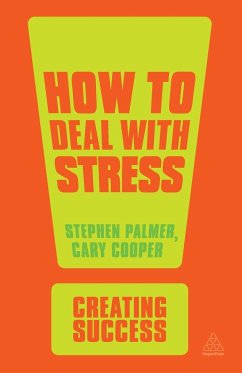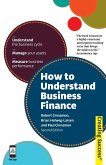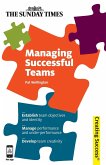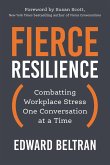18,99 €
inkl. MwSt.
Versandfertig in 1-2 Wochen

9 °P sammeln
- Broschiertes Buch
- Merkliste
- Auf die Merkliste
- Bewerten Bewerten
- Teilen
- Produkt teilen
- Produkterinnerung
- Produkterinnerung
How to Deal with Stress, 3rd edition, takes a psychological approach to stress, enabling you to build your own plan, gain control and improve your well-being.
Andere Kunden interessierten sich auch für
![How to Understand and Deal with Stress How to Understand and Deal with Stress]() Katy GeorgiouHow to Understand and Deal with Stress14,99 €
Katy GeorgiouHow to Understand and Deal with Stress14,99 €![How to Understand Business Finance How to Understand Business Finance]() Bob CinnamonHow to Understand Business Finance18,99 €
Bob CinnamonHow to Understand Business Finance18,99 €![How to Negotiate Effectively How to Negotiate Effectively]() David OliverHow to Negotiate Effectively18,99 €
David OliverHow to Negotiate Effectively18,99 €![Managing Successful Teams Managing Successful Teams]() Pat WellingtonManaging Successful Teams22,99 €
Pat WellingtonManaging Successful Teams22,99 €![How to Deal with Angry People How to Deal with Angry People]() Dr Ryan MartinHow to Deal with Angry People20,99 €
Dr Ryan MartinHow to Deal with Angry People20,99 €![Fierce Resilience Fierce Resilience]() Edward BeltranFierce Resilience28,99 €
Edward BeltranFierce Resilience28,99 €![How to Be Comfortable with Being Uncomfortable How to Be Comfortable with Being Uncomfortable]() Ben AldridgeHow to Be Comfortable with Being Uncomfortable20,99 €
Ben AldridgeHow to Be Comfortable with Being Uncomfortable20,99 €-
-
-
How to Deal with Stress, 3rd edition, takes a psychological approach to stress, enabling you to build your own plan, gain control and improve your well-being.
Hinweis: Dieser Artikel kann nur an eine deutsche Lieferadresse ausgeliefert werden.
Hinweis: Dieser Artikel kann nur an eine deutsche Lieferadresse ausgeliefert werden.
Produktdetails
- Produktdetails
- Creating Success
- Verlag: Kogan Page Ltd
- 3 Revised edition
- Seitenzahl: 226
- Erscheinungstermin: 1. April 2013
- Englisch
- Abmessung: 216mm x 140mm x 13mm
- Gewicht: 286g
- ISBN-13: 9780749467067
- ISBN-10: 0749467061
- Artikelnr.: 36402975
- Herstellerkennzeichnung
- Libri GmbH
- Europaallee 1
- 36244 Bad Hersfeld
- gpsr@libri.de
- Creating Success
- Verlag: Kogan Page Ltd
- 3 Revised edition
- Seitenzahl: 226
- Erscheinungstermin: 1. April 2013
- Englisch
- Abmessung: 216mm x 140mm x 13mm
- Gewicht: 286g
- ISBN-13: 9780749467067
- ISBN-10: 0749467061
- Artikelnr.: 36402975
- Herstellerkennzeichnung
- Libri GmbH
- Europaallee 1
- 36244 Bad Hersfeld
- gpsr@libri.de
Stephen Palmer, PhD, is one of the UK's most influential experts on stress management. He is Founder-Director at the Centre for Stress Management and Honorary Professor of Psychology at City University, London. He has written or edited over 30 books on stress management, psychotherapy and coaching. Cary Cooper, PhD, CBE, is Professor of Organizational Psychology and Health at Lancaster University, President of the British Association of Counselling and Psychotherapy and past President of the British Academy of Management.
Acknowledgements
Introduction
01 What is stress?
Simple definition
Pressure and stress
Costs of stress
How do you cope with stress?
Are you in control?
Health locus of control
The biology of stress
Summary
02 A working model of stress, coping and resilience
A model of stress, coping and resilience
Helpful versus unhelpful troublesome negative emotions
Important: choice of interventions
Summary
03 Changing your thinking
Changing your thinking: it isn't a modern concept!
As simple as ABC!
Thinking errors
Helpful challenging questions
'Pros and cons'
Stress thought record
Dealing with your own anger
Overcoming the self-esteem trap
Accepting others but not their behaviour
Inference chaining
Summary
04 Changing your imagery
Coping imagery
Self-motivation imagery
Staying-focused (or goal) imagery
Time-projection imagery
Relaxation imagery
Anti-craving imagery
Summary
05 Changing your behaviour
What are you, A or B?
Social support
Assertiveness training
Assertiveness rights
Assertiveness skills
The three-step model of assertion
Time management
Top tips for the time manager
Developing goals
Summary
06 Improving your physical health to help you conquer stress
Alcohol
Caffeine
Exercise
Nutrition
Weight control
Smoking
Relaxation
Summary
07 From problems to solutions
The PRACTICE model
Case study
The PRACTICE solutions Form
Summary
08 Dealing with work-related stress
Definition of stress
The financial and health impact of work-related stress
How do you cope with stress at work?
The unfit manager
The fit manager
Work-related stress risk assessment and interventions
Before you start a work-stress risk assessment
A comprehensive approach
What can you do?
Summary
09 Stress self-audit
10 Developing your own action plan
'Stress carriers'
Home-work interface
Action plan
Sample stress management action plan
Start now
Summary
Appendix
References and bibliography
Useful organizations
Introduction
01 What is stress?
Simple definition
Pressure and stress
Costs of stress
How do you cope with stress?
Are you in control?
Health locus of control
The biology of stress
Summary
02 A working model of stress, coping and resilience
A model of stress, coping and resilience
Helpful versus unhelpful troublesome negative emotions
Important: choice of interventions
Summary
03 Changing your thinking
Changing your thinking: it isn't a modern concept!
As simple as ABC!
Thinking errors
Helpful challenging questions
'Pros and cons'
Stress thought record
Dealing with your own anger
Overcoming the self-esteem trap
Accepting others but not their behaviour
Inference chaining
Summary
04 Changing your imagery
Coping imagery
Self-motivation imagery
Staying-focused (or goal) imagery
Time-projection imagery
Relaxation imagery
Anti-craving imagery
Summary
05 Changing your behaviour
What are you, A or B?
Social support
Assertiveness training
Assertiveness rights
Assertiveness skills
The three-step model of assertion
Time management
Top tips for the time manager
Developing goals
Summary
06 Improving your physical health to help you conquer stress
Alcohol
Caffeine
Exercise
Nutrition
Weight control
Smoking
Relaxation
Summary
07 From problems to solutions
The PRACTICE model
Case study
The PRACTICE solutions Form
Summary
08 Dealing with work-related stress
Definition of stress
The financial and health impact of work-related stress
How do you cope with stress at work?
The unfit manager
The fit manager
Work-related stress risk assessment and interventions
Before you start a work-stress risk assessment
A comprehensive approach
What can you do?
Summary
09 Stress self-audit
10 Developing your own action plan
'Stress carriers'
Home-work interface
Action plan
Sample stress management action plan
Start now
Summary
Appendix
References and bibliography
Useful organizations
Acknowledgements
Introduction
01 What is stress?
Simple definition
Pressure and stress
Costs of stress
How do you cope with stress?
Are you in control?
Health locus of control
The biology of stress
Summary
02 A working model of stress, coping and resilience
A model of stress, coping and resilience
Helpful versus unhelpful troublesome negative emotions
Important: choice of interventions
Summary
03 Changing your thinking
Changing your thinking: it isn't a modern concept!
As simple as ABC!
Thinking errors
Helpful challenging questions
'Pros and cons'
Stress thought record
Dealing with your own anger
Overcoming the self-esteem trap
Accepting others but not their behaviour
Inference chaining
Summary
04 Changing your imagery
Coping imagery
Self-motivation imagery
Staying-focused (or goal) imagery
Time-projection imagery
Relaxation imagery
Anti-craving imagery
Summary
05 Changing your behaviour
What are you, A or B?
Social support
Assertiveness training
Assertiveness rights
Assertiveness skills
The three-step model of assertion
Time management
Top tips for the time manager
Developing goals
Summary
06 Improving your physical health to help you conquer stress
Alcohol
Caffeine
Exercise
Nutrition
Weight control
Smoking
Relaxation
Summary
07 From problems to solutions
The PRACTICE model
Case study
The PRACTICE solutions Form
Summary
08 Dealing with work-related stress
Definition of stress
The financial and health impact of work-related stress
How do you cope with stress at work?
The unfit manager
The fit manager
Work-related stress risk assessment and interventions
Before you start a work-stress risk assessment
A comprehensive approach
What can you do?
Summary
09 Stress self-audit
10 Developing your own action plan
'Stress carriers'
Home-work interface
Action plan
Sample stress management action plan
Start now
Summary
Appendix
References and bibliography
Useful organizations
Introduction
01 What is stress?
Simple definition
Pressure and stress
Costs of stress
How do you cope with stress?
Are you in control?
Health locus of control
The biology of stress
Summary
02 A working model of stress, coping and resilience
A model of stress, coping and resilience
Helpful versus unhelpful troublesome negative emotions
Important: choice of interventions
Summary
03 Changing your thinking
Changing your thinking: it isn't a modern concept!
As simple as ABC!
Thinking errors
Helpful challenging questions
'Pros and cons'
Stress thought record
Dealing with your own anger
Overcoming the self-esteem trap
Accepting others but not their behaviour
Inference chaining
Summary
04 Changing your imagery
Coping imagery
Self-motivation imagery
Staying-focused (or goal) imagery
Time-projection imagery
Relaxation imagery
Anti-craving imagery
Summary
05 Changing your behaviour
What are you, A or B?
Social support
Assertiveness training
Assertiveness rights
Assertiveness skills
The three-step model of assertion
Time management
Top tips for the time manager
Developing goals
Summary
06 Improving your physical health to help you conquer stress
Alcohol
Caffeine
Exercise
Nutrition
Weight control
Smoking
Relaxation
Summary
07 From problems to solutions
The PRACTICE model
Case study
The PRACTICE solutions Form
Summary
08 Dealing with work-related stress
Definition of stress
The financial and health impact of work-related stress
How do you cope with stress at work?
The unfit manager
The fit manager
Work-related stress risk assessment and interventions
Before you start a work-stress risk assessment
A comprehensive approach
What can you do?
Summary
09 Stress self-audit
10 Developing your own action plan
'Stress carriers'
Home-work interface
Action plan
Sample stress management action plan
Start now
Summary
Appendix
References and bibliography
Useful organizations







